- Home
- Gordon Korman
Unsinkable
Unsinkable Read online
TITANIC
BOOK ONE
UNSINKABLE
GORDON KORMAN
FOR JAY
Contents
Cover
Title Page
PROLOGUE
Chapter One
Chapter Two
Chapter Three
Chapter Four
Chapter Five
Chapter Six
Chapter Seven
Chapter Eight
Chapter Nine
Chapter Ten
Chapter Eleven
Chapter Twelve
Chapter Thirteen
Chapter Fourteen
Chapter Fifteen
Chapter Sixteen
Chapter Seventeen
Chapter Eighteen
Chapter Nineteen
Chapter Twenty
Chapter Twenty-One
Chapter Twenty-Two
Chapter Twenty-Three
Chapter Twenty-Four
Epilogue
About the Author
Look for more adventure from Gordon Korman
Copyright
PROLOGUE
RMS CARPATHIA
MONDAY, APRIL 15, 1912, 9:30 A.M.
They stood four deep on the afterdeck of the Carpathia, chilled to the bone, staring out at nothing.
Dark water, light swells — no evidence that barely seven hours before, the largest and most magnificent ship the world had ever seen had sailed here in all her glory. The truth was nearly impossible to believe: The RMS Titanic lay at the bottom of the sea, along with everyone who sailed in her, save the 706 souls rescued and now aboard the Carpathia.
“Look!”
The cry energized the exhausted throng. A flash of color among the endless waves. A survivor?
And then the swell turned over the item that stirred their frozen hearts with momentary hope. A deck chair. Nothing more.
How could this be? The Titanic was more than a steamship. She was a floating city, a sixth of a mile in length and 90 feet abeam, 66,000 tons gross displacement. Was this piece of flotsam all that was left? How could so much have become so little?
A uniformed steward — no more than seventeen years old — tried to take the arm of a lady who was shivering in the folds of a Cunard Line blanket.
“There’s tea and soup below, ma’am,” he said. “Please come out of this cold and wind.”
She shook him off, mindless of his attempted kindness. “Go away. We have just seen our husbands drown.”
The young seaman bit his tongue. She would probably take no comfort in knowing that, of the 1,517 passengers and crew lost in this tragedy, very few lives had been snuffed out by drowning. The sea that had swallowed their ship was 28 degrees Fahrenheit, well below the freezing point of freshwater. What the victims had suffered was unimaginable, as if their entire bodies had been suddenly packed in ice. Shock would have set in after barely sixty seconds. Next, unconsciousness, followed swiftly by death. No human could survive more than a few minutes in water that was as cold as the ice that had ripped open the belly of the great ship.
That ice was very much in evidence around the Carpathia. The horizon was dotted with distant bergs and, to the north, pack ice.
Many ships had encountered ice on the North Atlantic crossing the previous night. All but one had survived. The greatest of them all. The unsinkable Titanic.
CHAPTER ONE
BELFAST
WEDNESDAY, MARCH 27, 1912, 2:12 P.M.
The punch struck Paddy square in the jaw, rattling his teeth. It hurt more than he expected — more than it needed to hurt. He wasn’t even acting when he staggered backward into the man in the houndstooth cloak.
A slim white hand slipped out of the boy’s ragged sleeve and found its way into the cloak’s patch pocket. It emerged a split second later, the small fingers deftly clutching a gold money clip fat with banknotes. That, too, disappeared, flicked under his threadbare jacket.
The man shoved him away, growling, “Keep your brawling from decent people, boy!”
Paddy suppressed a grin. He always enjoyed it when the mark helped out by sending him off with the stolen purse. By the time the rich fool realized he’d been robbed, Paddy would be far away, counting the windfall.
All that remained was to finish the street theater that had provided cover for the theft. He lunged at Daniel, burying his fist in his partner’s stomach — revenge for that haymaker to the jaw.
“I’ll do you for that!” Daniel wheezed.
Then, like so many times before, Paddy fled the scene, Daniel in hot pursuit, bellowing threats. The crowd parted to let them go, as if the passersby were their accomplices, and the horse-drawn buggies and electric trolleys had been placed there as obstacles to aid their escape.
The pair kept running, dashing down side streets and through the back lanes they knew so well. At last, they collapsed against each other, laughing and celebrating their success.
“Curse your evil heart, Daniel Sullivan!” Paddy cried. “Were you trying to break my jaw? I’ll be black and blue for a week, thanks to you!”
“It can only make you handsomer,” Daniel chortled, rubbing his stomach. “You talk like you didn’t just knock the breath out of me. If I can’t run away, who are you going to start your next dustup with? Yourself?”
“To listen to your whining,” Paddy bantered, “you’d think I couldn’t get along without you. With you clapped up in jail, this fat purse would be all mine.” He took out the money clip, and the two examined their prize.
Daniel’s eyes bulged. “I didn’t know the Prince of Wales was walking down Victoria Street!”
Paddy nodded. “This is a fortune!”
They fell silent, counting the haul over and over again. They were accustomed to worn purses containing a few meager coins. But the clip held twelve crisp banknotes worth one pound sterling each. This was enough money to replace their rags with warm clothing and proper shoes. It would keep their always-empty bellies full for a long time.
Paddy caught his breath first. “If I’d known about this, I’d have had his watch, too! And maybe the gold out of his teeth!”
At fifteen, Daniel was a year older than Paddy and considered himself more worldly. “We’ll have no easy time spending these,” he predicted. “When the likes of us hands over a brand-new banknote, there’s not a shopkeeper in Belfast who won’t know we stole it.”
That wasn’t what Paddy wanted to hear. “Are you saying we fell on a king’s ransom, and it’s worthless to us? Maybe you’re afraid to spend it, but I’m not.”
Daniel tried to be patient. “Think, Patrick. What kind of man likes his money in paper notes printed by a bank? Someone who’s got so much of it he’d need a barrow just to carry the silver. When you spy your reflection in a window, do you see that person?”
Paddy was stubborn. “I’m going to be that person someday, so this will be good practice.”
Daniel threw his hands up. “I’m just saying we should be careful. And if you had half the brains God gave geese, you’d know it.”
They argued often, but never with lasting effect. Despite all their insults and bickering, Paddy Burns and Daniel Sullivan had been closer than brothers since the day they’d met. It was a bond forged by friendship, but also by something darker. Daniel was an orphan who had fled the life of a chimney sweep’s climbing boy. Paddy had walked sixty-seven miles to Belfast after the last whiskey-driven beating he intended to endure from his stepfather. There was no question that each was all the other had in the world.
They stashed the money in their secret hiding place behind a loose brick in an ancient wall — “There are pickpockets and footpads out there,” Paddy reminded his friend. “Look what happened to the gentleman who used to own all this lovely money.”
Then they headed back toward the most crowded part of the city — Queens Island, home of Harland and Wolff, the largest shipyard in the world. It was a hub of activity, with more than fifteen thousand employees working shifts around the clock. All Belfast seemed to orbit this center. It was a pickpocket’s dream.
The boys watched from across the road as a trolley let off dozens of passengers. Paddy’s eyes settled on a short, squat man whose overcoat bulged where a purse might be carried.
Daniel read his friend’s mind. “No, not him. Look how down-at-the-heel his boots are. He needs the money.”
The two had an informal agreement never to make a victim of a poor man — even though they themselves were always much, much poorer. Their unfortunate situation forced them to live by their wits and steal to survive. But there was a line they would not cross, knowing that they weren’t the only hungry youngsters in Belfast. Besides, there were plenty of peacocks, plump in the pocket, just waiting to be plucked.
And there’s one right now, thought Paddy.
The gentleman stepping down from the hansom cab wasn’t dressed so differently from the other men on the street — in a tweed coat, a suit, and a bowler hat. Yet every article seemed pressed and perfect, down to the elegant knot of his silk cravat. There was a quiet confidence to his bearing, a sureness to his step. And, Paddy guessed, a fullness to the purse concealed by his overcoat.
With an almost imperceptible signal to his friend, he fell in line behind the new mark, heading toward the shipyard gate.
“No!” rasped Daniel, rushing to keep pace. “Don’t you know who that is?”
Paddy nodded vigorously. “A proper swell who can well afford to part with a few coins for our favorite charity.”
“That’s Mr. Thomas Andrews, the designer of the Titanic!”
Paddy was impressed. Even though the name Thomas Andrews meant nothing to him, a fellow would have to be deaf and blind not to know about the Titanic, the world’s greatest ocean liner, under construction right here at Harland and Wolff. Those four towering smokestacks dominated the Belfast landscape. There was hardly a spot in the city where they couldn’t be seen.
Paddy and Daniel had first met in the enormous crowd that had gathered to watch the launch from dry dock a year earlier. Paddy had been there to help himself to a purse or two. But as he watched the massive hull sliding down the ramp and into the Belfast Harbor, he’d forgotten the emptiness in his pockets and his stomach. It — she — Daniel constantly corrected him that ships were always she — was a dazzling sight.
The Titanic had only grown more magnificent as she lay in her slip to be fully outfitted. It was said that neither a millionaire’s mansion nor a king’s palace was more lavishly appointed than this mistress of the sea.
And, Paddy reminded himself, had it not been for the Titanic, he would not have tried to pick Daniel’s pocket on that launch day. Then he would have been alone, or perhaps even dead. So he owed Mr. Thomas Andrews that much.
Just before the main gate, Andrews suddenly wheeled on them. “If you two young gentlemen have your eyes on my purse, you’d best know that I’ll not part with it easily.”
It was the first time that anyone had referred to Paddy Burns as a gentleman, and possibly the last time anyone ever would.
“Mr. Andrews, sir” — Daniel was nervously worshipful — “is it true that the fourth smokestack is a fake?”
The shipbuilder looked surprised, and then he smiled. “Does the heart of an engineer beat inside that thin chest? Wherever did you hear about that?”
Paddy spoke up. “Daniel reads, Mr. Andrews. He even taught me a little.” Daniel’s interest in books and newspapers had bewildered Paddy at first. Why risk arrest to steal something that couldn’t put food in your belly? Now he saw that Daniel’s passion for reading was a hunger just as urgent as an empty stomach. Paddy didn’t understand it — not yet, anyway. But he knew it to be true.
“Impressive,” Andrews approved. “Well, boys, the fourth smokestack is not connected to the boilers, but you could hardly call it a fake. It provides ventilation. And, of course, it is a recognizable feature of both the Titanic and her sister ship, the Olympic.”
Daniel’s thin, pale face was almost alight with interest. “And she’s truly unsinkable?”
The shipbuilder chuckled. “Anything made of metal has the potential to sink. But see if you can understand this: Titanic’s hull is divided into sixteen compartments. At the touch of a single button on the bridge, the captain can close watertight doors, sealing those compartments from one another.” He paused. “She can remain afloat with any four of those sixteen compartments flooded. It’s safe to say that no one can envision an accident that would do more damage to her than that.”
“I can!” Daniel exclaimed eagerly.
Andrews’s eyes widened. “Do tell.”
“Well, I — I don’t know it right now, sir,” Daniel stammered in embarrassment. “But if you’ll give me a little time, I’m sure something will occur to me.”
The shipbuilder seemed amused, but also intrigued. “It might at that,” he agreed with a smile. “And if it does, I should be very interested to hear it.”
“He can do it, too!” Paddy put in. “Daniel’s really smart!”
Andrews’s smile grew wider. “Then I shall direct my staff that if a Master Daniel and companion should come calling, they are to be brought to me at once.”
The guard at the gate blocked the boys’ way. “Be off, you two!” he shouted. “And stop bothering Mr. Andrews!”
The shipbuilder made a point of shaking both boys’ grubby hands. “It’s all right, Joseph,” he said. “We were discussing business.” He tipped his bowler hat to them. “Gentlemen. I trust we’ll meet again.” And he disappeared into the bustling yard.
Paddy and Daniel stood there long after he was gone, astonished that such a great man had treated two street lads with kindness and respect.
CHAPTER TWO
LONDON
FRIDAY, MARCH 29, 1912, 11:45 A.M.
Piccadilly Circus was always one of the busiest areas of London. But today, busy was an inadequate description. Hundreds of horse-drawn carriages and automobiles powered by gasoline, steam, and electric motors were locked at a standstill in the roundabout. Klaxons honked, bells rang, and angry drivers and coachmen bellowed their frustrations at top volume. The traffic extended up the five main streets that fed the circle, especially choking crowded Regent Street. The cacophony of protest grew louder and louder. No one was going anywhere.
The cause of this huge disruption to London life was perched on the pedestal of the statue of Eros at the center of the roundabout. Mrs. Amelia Bronson of Boston, Massachusetts, the famous American suffragist, was holding a rally in the place where she knew it would draw the most attention. Her strident voice, directed by a large cone megaphone, rose above the general din.
“Votes for women!” she thundered, provoking a chant from the mass of female humanity, resplendent in the colors of their movement: purple, white, and green.
“Votes for women!” they shouted back, making the air ring with their demand.
“Move out of the road, you shameless baggage!” bellowed a lorry driver.
Other cries echoed his sentiments, their words not so polite. London saw its share of political activism for a wide variety of causes, but not from women, who were expected to be obedient and demure. The “suffragettes” were considered unfeminine, rebellious, and even immoral. The crowd was growing ugly.
Fourteen-year-old Sophie Bronson reached up and tugged at the hem of her mother’s dress. “Mother —” she said in a low voice. And was ignored. “Mother —” A little louder.
“Not now, Sophie. Things are escalating.”
“I know they are,” her daughter replied. “This isn’t like Boston or Hartford or Providence. You can feel the rage in the air!”
“That rage is the tool men use to cling to an outmoded system where half the population is kept as
second-class citizens!”
“Mother, you know as well as I do that most of this rage is from people who only wish to get on their way past Piccadilly Circus.”
Sharp whistle blasts bit into the chill air.
“Here come the police!” Sophie exclaimed. “You’re going to be arrested again!”
“I’m counting on it.” Amelia Bronson beamed. “I didn’t journey all the way to England to be ignored by the papers!”
Sophie groaned. “Then everything they say about you will be true. You really are a radical foreign agitator.”
“I am what I need to be for the good of our movement” was Amelia’s stalwart reply.
The bobbies came upon the throng — dozens of them, arresting the women en masse, shouting and shoving them roughly.
Amelia Bronson jumped down from the pedestal, held her arms out in front of her, and declared, “Go ahead, clap me in irons! Show the world and your own wives and your own mothers how you hate women!”
“Got nothing against women, mum,” said one constable in a strained voice. “It’s American troublemakers what gives me a problem.”
He made to shackle her wrists, and a large Englishwoman ripped off his helmet by the chinstrap and began beating him with it. The constable wheeled on her and brought his truncheon down on the top of her head.
Sophie had resolved to stay out of the fray. Back at home in Boston, her father had assigned her such duties as keeping her mother out of prison and bailing her out of jail. But when Sophie saw the blood running down the face of the suffragist who had tried to defend Amelia Bronson, a red haze descended over her vision. She attacked the constable, leaping onto his back and wrapping her arms around his head. Her arrest followed hard upon.
Later, in the horse-drawn paddy wagon, Sophie was forced to endure the further humiliation of criticism from her mother as the prisoners all sat chained together by the ankles.
“Sophie, I’m very disappointed in you. You know better than this.”

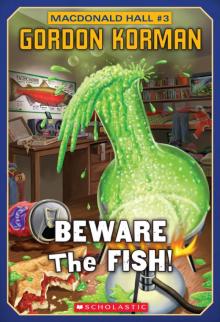 Beware the Fisj
Beware the Fisj Slacker
Slacker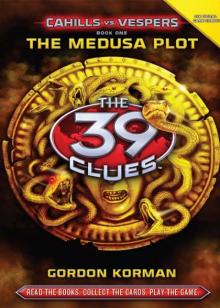 The Medusa Plot
The Medusa Plot This Can't Be Happening at MacDonald Hall!
This Can't Be Happening at MacDonald Hall!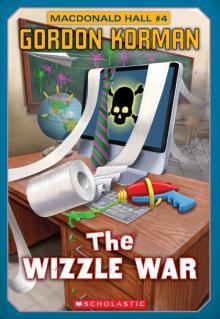 The War With Mr. Wizzle
The War With Mr. Wizzle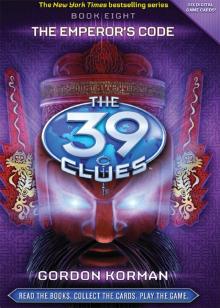 The Emperor's Code
The Emperor's Code Zoobreak
Zoobreak The Danger
The Danger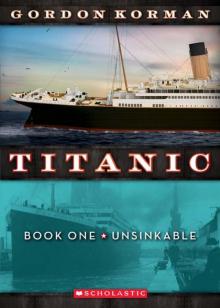 Unsinkable
Unsinkable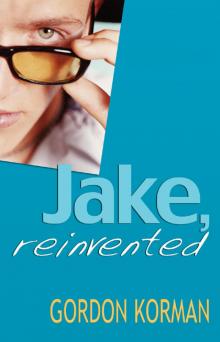 Jake, Reinvented
Jake, Reinvented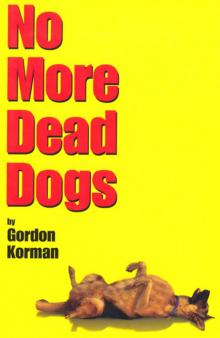 No More Dead Dogs
No More Dead Dogs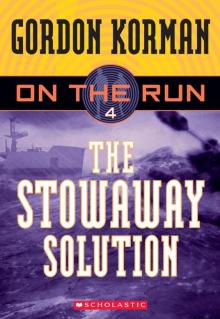 The Stowaway Solution
The Stowaway Solution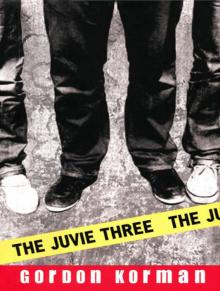 The Juvie Three
The Juvie Three The Climb
The Climb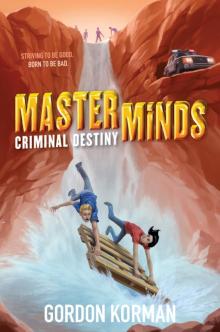 Criminal Destiny
Criminal Destiny Hideout: The First Adventure
Hideout: The First Adventure Flashpoint
Flashpoint Swindle
Swindle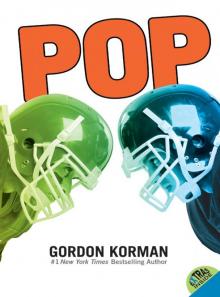 Pop
Pop The Rescue
The Rescue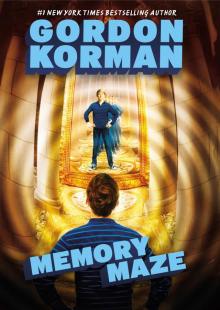 Memory Maze
Memory Maze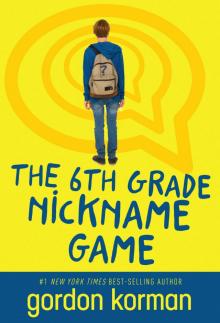 The Sixth Grade Nickname Game
The Sixth Grade Nickname Game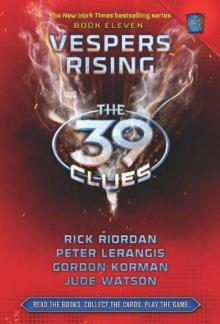 Vespers Rising
Vespers Rising Collision Course
Collision Course The Abduction
The Abduction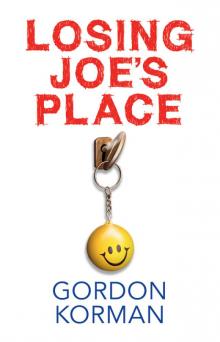 Losing Joe's Place
Losing Joe's Place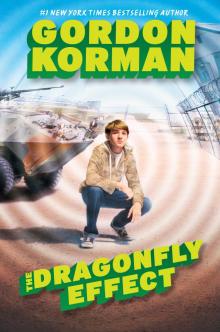 The Dragonfly Effect
The Dragonfly Effect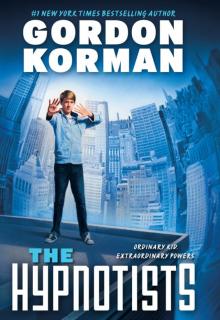 The Hypnotists
The Hypnotists Survival
Survival Lights, Camera, DISASTER!
Lights, Camera, DISASTER! Payback
Payback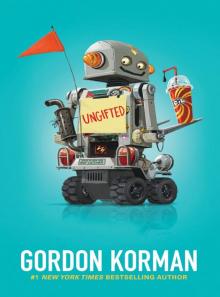 Ungifted
Ungifted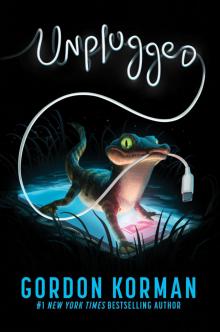 Unplugged
Unplugged Framed
Framed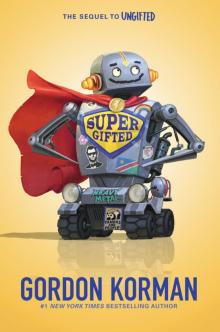 Supergifted
Supergifted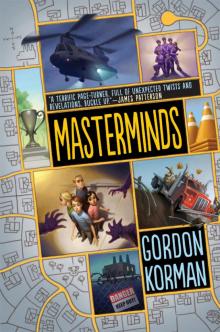 Masterminds
Masterminds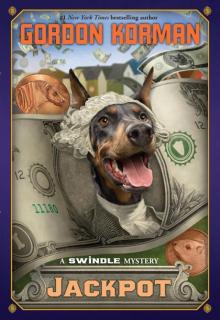 Jackpot
Jackpot Don't Care High
Don't Care High The Deep
The Deep Go Jump in the Pool!
Go Jump in the Pool! The Contest
The Contest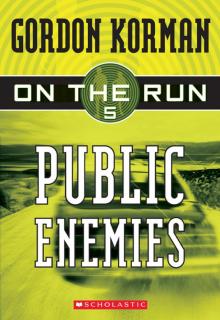 Public Enemies
Public Enemies Hideout: The Second Adventure
Hideout: The Second Adventure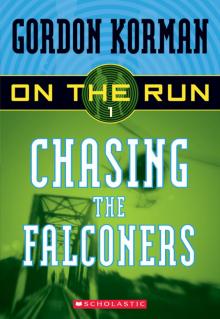 Chasing the Falconers
Chasing the Falconers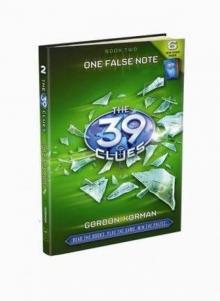 One False Note
One False Note Shipwreck
Shipwreck Jingle
Jingle Unleashed
Unleashed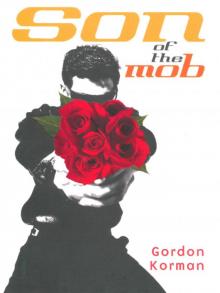 Son of the Mob
Son of the Mob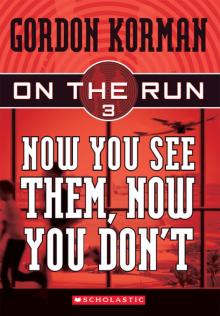 Now You See Them, Now You Don't
Now You See Them, Now You Don't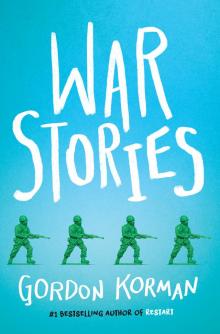 War Stories
War Stories Schooled
Schooled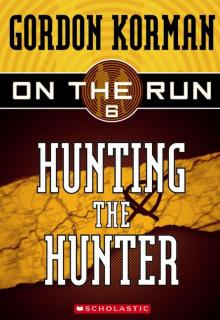 Hunting the Hunter
Hunting the Hunter The Zucchini Warriors
The Zucchini Warriors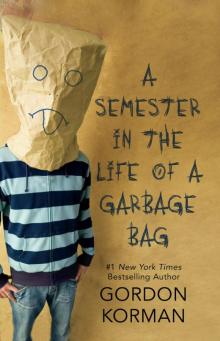 A Semester in the Life of a Garbage Bag
A Semester in the Life of a Garbage Bag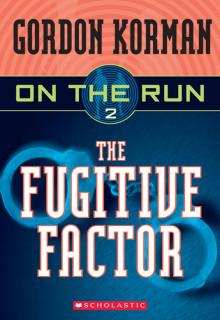 The Fugitive Factor
The Fugitive Factor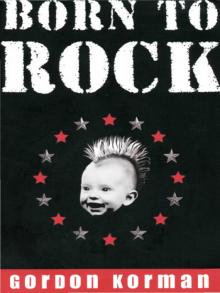 Born to Rock
Born to Rock The Summit
The Summit Showoff
Showoff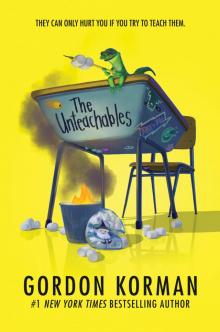 The Unteachables
The Unteachables The Third Adventure
The Third Adventure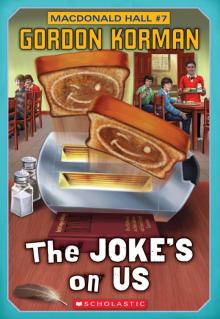 The Joke's on Us
The Joke's on Us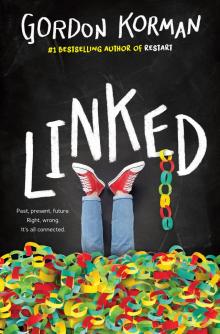 Linked
Linked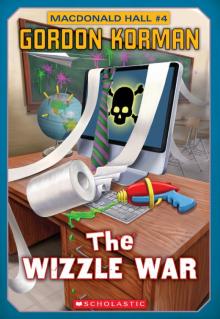 The Wizzle War
The Wizzle War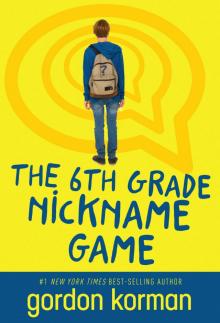 The 6th Grade Nickname Game
The 6th Grade Nickname Game The Second Adventure
The Second Adventure The First Adventure
The First Adventure![39 Clues : Cahills vs. Vespers [01] The Medusa Plot Read online](http://i1.bookreadfree.com/i2/04/10/39_clues_cahills_vs_vespers_01_the_medusa_plot_preview.jpg) 39 Clues : Cahills vs. Vespers [01] The Medusa Plot
39 Clues : Cahills vs. Vespers [01] The Medusa Plot